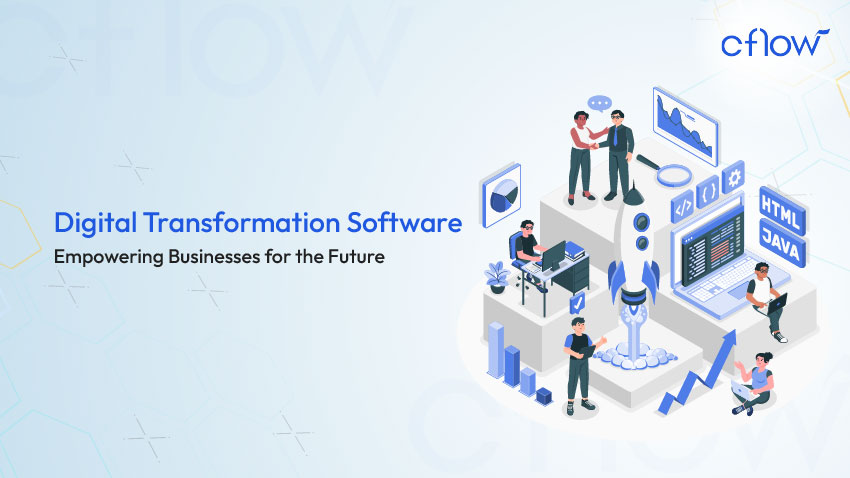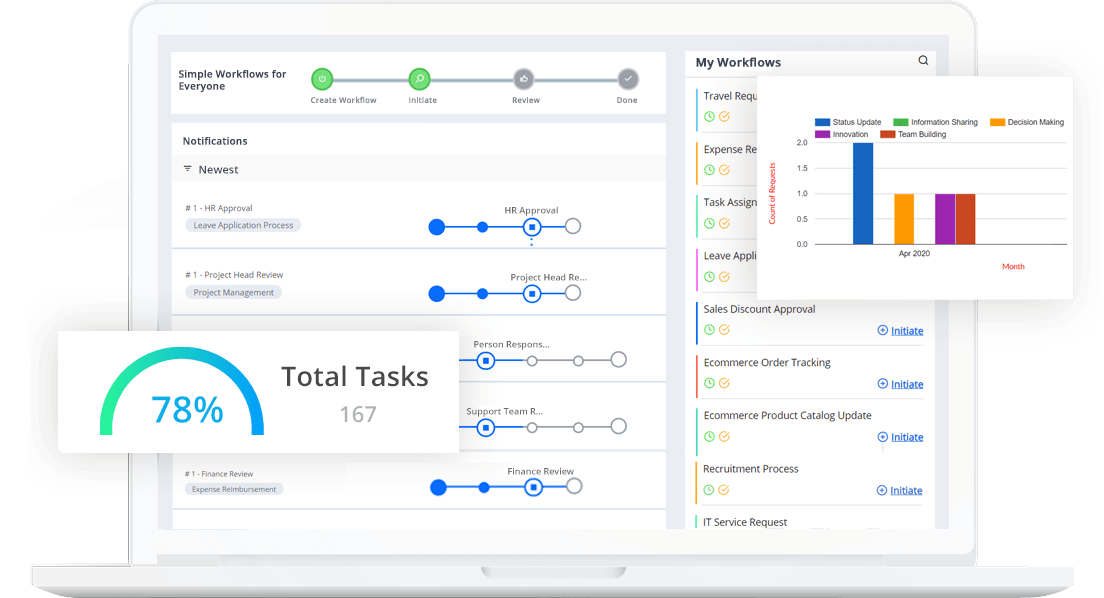Digital Transformation Software: Empowering Businesses for the Future

Key takeaways
- Digital transformation software is essential for businesses to improve efficiency, collaboration, and decision-making.
- Companies investing in enterprise digital transformation platforms gain a competitive edge in today’s digital economy.
- Automation, analytics, and AI-driven insights are key features of effective business transformation software.
- Choosing the right digital transformation platform requires evaluating integration capabilities, scalability, and security.
Digital transformation is reshaping the way businesses operate, enhancing efficiency, and creating new growth opportunities. 61% of business executives recognize digital transformation as a top priority in their organizations. From automating workflows to improving collaboration, these platforms provide essential tools that drive innovation and optimize operations.
As businesses embrace digital transformation, they require enterprise digital transformation platforms that integrate with existing systems, enable seamless data flow, and provide actionable insights. Whether streamlining internal processes or enhancing customer engagement, the right business transformation software ensures sustainable success in an ever-evolving digital landscape.
This blog explores the importance of digital transformation software, its key features, various categories, and the best tools available in the market for 2025.
What is Digital Transformation Software?
Digital transformation software refers to a suite of digital tools designed to modernize business processes, automate workflows, and optimize operational efficiency. These solutions help organizations transition from traditional manual processes to cloud-based, AI-powered, and automation-driven ecosystems. By integrating advanced technology, businesses can streamline operations, enhance decision-making, and reduce operational costs.
Automation eliminates repetitive tasks, reducing manual intervention and minimizing errors. This enables employees to focus on strategic initiatives, fostering efficiency and innovation. Improved collaboration plays a crucial role in business success, as enterprise digital transformation platforms facilitate real-time communication, seamless information sharing, and workflow synchronization, ensuring alignment among teams and stakeholders.
Data-driven decision-making is another significant benefit of digital transformation management software. Powerful analytics and real-time insights allow businesses to optimize strategies, anticipate market demands, and improve performance. Companies like Amazon and Tesla have successfully leveraged business transformation software to automate processes, enhance customer experiences, and scale operations efficiently. Additionally, software digital transformation solutions provide businesses with cloud-based automation, enhanced security, and workflow integration, enabling organizations to remain agile and competitive in a rapidly evolving digital landscape.
By embracing digital transformation software, businesses can drive long-term growth and sustainability while optimizing enterprise-wide processes and technological innovation.
Table of Contents
The Purpose of Digital Transformation Software
Digital transformation software plays a crucial role in modernizing business operations, improving efficiency, and driving innovation. By leveraging enterprise digital transformation platforms, organizations can automate processes, enhance collaboration, and gain actionable insights, ensuring they remain agile, competitive, and prepared for future technological advancements.
1. Enhance Organizational Capabilities for Efficiency
By integrating workflow automation, AI, and data analytics, organizations can eliminate inefficiencies, reduce errors, and enhance decision-making. A well-structured digital transformation platform enables businesses to streamline operations and scale seamlessly.
2. Strengthen Cross-Functional Collaboration
Effective business transformation software fosters collaboration between departments, enabling real-time communication, document sharing, and workflow tracking. Organizations using integrated platforms experience increased transparency, faster project completion, and improved cross-functional teamwork.
3. Boost Agility and Innovation
A digital business transformation platform equips companies with the tools to adapt quickly to market changes. By leveraging AI and machine learning, businesses can analyze trends, automate responses, and enhance customer engagement, making them more agile and innovative.
Categories of Digital Transformation
Digital transformation can be divided into four key categories, each addressing different aspects of business modernization. Organizations must embrace these transformations to remain competitive, whether through process automation, business model innovation, technological expansion, or cultural shifts. Implementing the right digital transformation software ensures seamless integration and long-term success.
1. Process Transformation
Process transformation focuses on automating repetitive tasks, streamlining workflows, and improving operational efficiency through AI-powered solutions. Businesses leverage enterprise digital transformation platforms to reduce manual workloads, enhance productivity, and ensure real-time data access. By integrating AI, machine learning, and automation, companies can optimize decision-making and achieve faster, error-free execution of core business processes.
2. Business Model Transformation
Business model transformation involves shifting from traditional operations to digital-first strategies to remain competitive in a rapidly evolving market. This includes leveraging cloud services, remote work technologies, and AI-driven customer engagement tools. Businesses adopting digital business transformation platforms benefit from increased scalability, enhanced service offerings, and innovative revenue streams that align with the digital economy.
3. Domain Transformation
Domain transformation refers to expanding business capabilities by adopting new digital markets and technologies such as cloud computing, blockchain, and IoT. Companies that integrate software digital transformation tools can enter new industries, offer digital-first services, and redefine customer interactions. This transformation allows organizations to diversify revenue streams and capitalize on emerging opportunities.
4. Cultural Transformation
Cultural transformation ensures organizations adopt a digital-first mindset by upskilling employees and fostering technology-driven work environments. By embracing enterprise digital transformation solutions, businesses can promote innovation, increase collaboration, and enhance agility. Investing in continuous learning, digital adoption training, and leadership support helps employees transition smoothly into the digital era.
Key Features in Digital Transformation Software
Modern digital transformation software offers advanced features that enhance efficiency, security, and decision-making. These tools streamline operations, improve collaboration, and enable businesses to stay agile in an evolving digital landscape. Here are some of the key features to look for.
- Integrations (with IoT, hardware, and other systems) – Seamlessly connect with IoT, cloud computing, and legacy systems, enabling smooth workflow automation and digital adoption.
- Digital Templates – Provides pre-designed workflow templates that accelerate business process automation, reducing manual setup time and ensuring efficiency.
- Workflow Automation – Uses AI-driven automation to minimize manual tasks, enhance productivity, and optimize operational workflows.
- AI and Machine Learning – Delivers predictive analytics and data-driven insights, helping businesses make smarter decisions while automating repetitive tasks.
- Asset Management – Tracks business resources, optimizes utilization, and ensures efficient inventory and operations management.
- Collaborative Workspace – Facilitates real-time document sharing, instant communication, and seamless project collaboration across teams and departments.
- Analytics and Reporting – Generate actionable insights, performance reports, and KPI tracking to drive data-driven business strategies.
- Data Security – Ensures compliance with GDPR, SOC 2, and industry regulations, protecting sensitive business data from cyber threats.
- Customer Journey Mapping – Enhances customer experience tracking by analyzing interactions, optimizing touchpoints, and personalizing engagement strategies.
- Mobile Accessibility with Offline Capabilities – Provides anytime, anywhere access to workflows, ensuring productivity even in offline environments.
Different Types of Digital Transformation Platforms
Businesses require various digital transformation platforms to streamline operations, improve decision-making, and enhance customer experiences. These platforms provide automation, analytics, and integration capabilities, enabling organizations to optimize efficiency and remain competitive in an evolving digital landscape. Below are the key types of business transformation software that help businesses scale and adapt.
1. Accounting Software
Accounting software automates financial processes such as invoicing, payroll, tax management, and expense tracking, ensuring compliance with industry regulations. By reducing manual errors and enhancing reporting accuracy, businesses can maintain financial health and optimize cash flow management.
2. Business Intelligence (BI) Software
BI software provides advanced data analytics, real-time reporting, and trend forecasting, allowing organizations to make data-driven decisions. By integrating with enterprise digital transformation platforms, companies gain actionable insights to improve performance and strategy.
3. Customer Relationship Management (CRM) Software
CRM software helps businesses manage customer interactions, sales pipelines, and support services, improving customer engagement and retention. By automating communication and tracking customer preferences, companies can enhance sales efficiency and service personalization.
4. Enterprise Resource Planning (ERP) Systems
ERP systems unify finance, HR, supply chain, and operations management into a single platform. Businesses use ERP solutions to enhance efficiency, improve collaboration between departments, and centralize data management for better decision-making.
5. Cloud Storage and Collaboration Tools
Cloud-based platforms enable secure document sharing, real-time collaboration, and remote access to business files. These tools improve workflow automation, data security, and productivity, ensuring teams can work efficiently from any location.
6. E-commerce Platforms
E-commerce platforms empower businesses to sell products and services online, manage orders, track inventory, and engage customers. Features like AI-driven recommendations and digital payment processing enhance user experience and conversion rates.
7. Supply Chain Management (SCM) Software
SCM software optimizes inventory tracking, logistics, and supplier management, ensuring smooth business operations. These solutions help businesses reduce costs, mitigate risks, and improve the efficiency of supply chain processes.
8. Human Resources (HR) Management Software
HR software automates essential HR functions, including recruitment, payroll processing, employee benefits management, and compliance tracking. By integrating AI and analytics, businesses can streamline HR operations and improve workforce management.
9. Business Process Automation (BPA) Tools
BPA tools automate repetitive tasks, eliminate inefficiencies, and improve workflow management. These platforms help businesses scale operations, optimize workforce allocation, and ensure compliance with industry standards.
10. Digital Marketing Platforms
Digital marketing platforms provide SEO, social media management, email automation, and analytics tools to enhance brand visibility and customer engagement. AI-driven automation helps businesses optimize advertising strategies and improve ROI.
End-to-end workflow automation
Build fully-customizable, no code process workflows in a jiffy.
Top 5 Digital Transformation Software for 2025
1. Cflow (Best for No-Code Workflow Automation)
Cflow is an AI-based workflow automation platform that empowers businesses to automate processes, streamline approvals, and improve team productivity. Designed for enterprises of all sizes, Cflow eliminates repetitive manual tasks, enhances compliance, and integrates seamlessly with existing tools to support digital transformation.
Key Features:
- No-code automation for creating custom workflows
- Seamless integrations with third-party applications
- Advanced reporting and analytics for data-driven insights
Pros:
- User-friendly interface with a drag-and-drop workflow designer
- Highly scalable, making it suitable for businesses of all sizes
- Enhanced security with data encryption and compliance features
Cons:
- Requires initial setup configuration
- Limited offline functionality
2. Salesforce (Best for Customer Relationship Management)
Salesforce is a leading CRM and business automation platform that enables organizations to enhance customer engagement, manage sales pipelines, and integrate AI-driven analytics. It is widely used in enterprise digital transformation platforms for its scalability, automation capabilities, and seamless integration with various business applications.
Key Features:
- AI-powered predictive analytics for better customer insights
- Customizable dashboards and reporting for data-driven decision-making
- Omnichannel customer support to enhance user experiences
Pros:
- Highly customizable to fit different business needs
- Robust integration ecosystem with third-party apps like Slack, Microsoft Teams, and Google Workspace
- Scalable solution for businesses of all sizes
Cons:
- Expensive pricing for small businesses
- Steep learning curve due to its extensive feature set
- Complex setup and customization require skilled personnel
3. Zapier (Best for No-Code Automation & App Integrations)
Zapier is a no-code automation tool that connects different business applications, allowing data and workflows to move seamlessly between platforms. It helps businesses integrate digital transformation management software without requiring IT intervention, enabling automation across multiple applications.
Key Features:
- Connects 6,000+ apps including Google Suite, Trello, and Slack
- Automates workflows (Zaps) with triggers and actions
- Multi-step automation to streamline complex business processes
Pros:
- User-friendly and requires no coding knowledge
- Extensive integration capabilities with popular business tools
- Time-saving automation for repetitive tasks
Cons:
- Limited advanced workflow automation compared to full-scale BPA tools
- Pricing increases with more complex workflows
- Can experience occasional app connection issues
4. Liferay (Best for Digital Experience & Customer Engagement)
Liferay is an open-source digital experience platform designed for building and managing enterprise portals, customer self-service solutions, and collaboration platforms. It helps businesses improve their digital presence and engagement by enhancing the user experience across websites, mobile apps, and customer portals.
Key Features:
- Highly customizable CMS and DXP capabilities
- Enterprise-grade security for data protection
- Omnichannel user experience management
Pros:
- Flexible deployment options (cloud-based and on-premise)
- Integration-friendly with ERP, CRM, and third-party applications
- Strong security and compliance features
Cons:
- Requires technical expertise for customization and setup
- Can be resource-intensive for smaller businesses
- Limited support for non-technical users without prior experience
5. Snowflake (Best for Cloud Data Warehousing & Analytics)
Snowflake is a cloud-based data warehousing solution that enables businesses to store, analyze, and share large-scale data securely. With its scalable and pay-as-you-go pricing model, Snowflake is widely used for big data analytics, AI-driven insights, and enterprise data management.
Key Features:
- Cloud-native architecture with elastic scalability
- Seamless data integration across cloud storage platforms
- Advanced analytics and AI-driven insights
Pros:
- Highly scalable and cost-effective for data-intensive businesses
- Supports multi-cloud environments (AWS, Azure, Google Cloud)
- Fast query processing for real-time insights
Cons:
- Pricing can be complex based on usage
- Requires data engineering expertise for advanced analytics
- Limited support for real-time transaction processing
Conclusion
Adopting digital transformation software is crucial for businesses to remain competitive, improve efficiency, and drive innovation. Companies leveraging enterprise digital transformation platforms benefit from workflow automation, AI-driven analytics, and enhanced collaboration, enabling them to scale and adapt in a dynamic market. By streamlining operations and reducing manual inefficiencies, businesses can optimize resources and improve decision-making. Cflow provides no-code automation, seamless integrations, and advanced reporting, making it an ideal digital transformation management software for businesses seeking efficiency.
Sign up for Cflow today to automate processes, enhance collaboration, and accelerate your digital transformation journey effortlessly!
FAQs
- What is digital transformation software?
Digital transformation software helps businesses modernize operations, improve workflows, and leverage automation for better efficiency. - How does digital transformation benefit organizations?
It enhances productivity, fosters innovation, and ensures seamless collaboration across departments. - What should businesses consider when choosing a digital transformation platform?
Key factors include integration capabilities, security compliance, automation features, and scalability.
What should you do next?
Thanks for reading till the end. Here are 3 ways we can help you automate your business:

Do better workflow automation with Cflow
Create workflows with multiple steps, parallel reviewals. auto approvals, public forms, etc. to save time and cost.

Talk to a workflow expert
Get a 30-min. free consultation with our Workflow expert to optimize your daily tasks.

Get smarter with our workflow resources
Explore our workflow automation blogs, ebooks, and other resources to master workflow automation.
What would you like to do next?
Automate your workflows with our Cflow experts.



